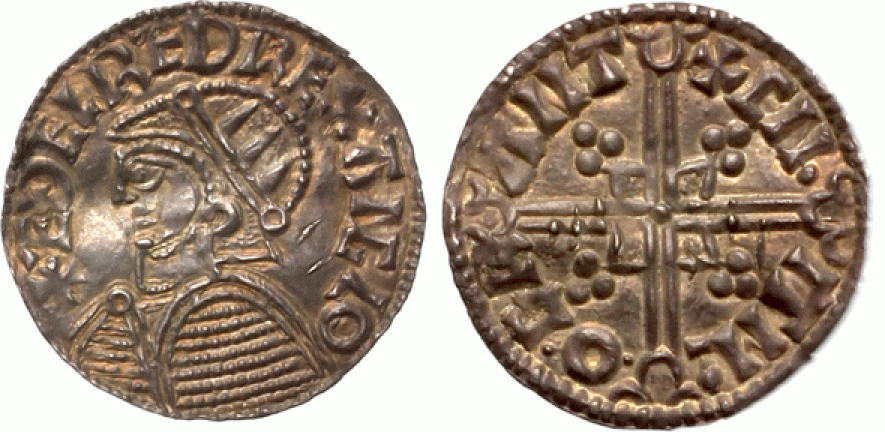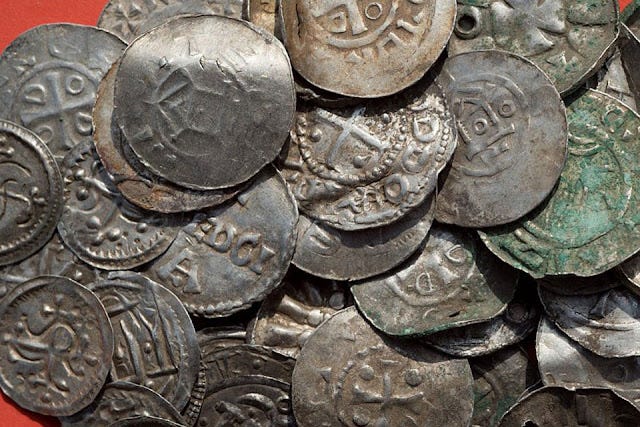Æthelred 'the Unready'
If we’re going to start thinking seriously about nicknames as a historical source, monarchs are a good place to start. For one, we have far more information about their lives than the average pre-Conquest individual - by constructing a more indepth biography around them, we can begin to explore the events in their lives that might have led to their nicknames, and the ‘meanings’ of them. But also, in the popular imagination of the pre-Conquest period, it is the nicknames of monarch which are most readily repeated: Alfred is remembered as ‘the Great’, Edward as ‘the Confessor’, and William as ‘The Conqueror’ (or, less charitably, ‘the Bastard’).1 This week, however, we’re going to be taking a look at ill-fated (and much maligned) king Æthelred ‘the Unready’.2
Photo Source: https://www.royal.uk/ethelred-ii-unready-r-978-1013-and-1014-1016
Æthelred is traditionally remembered to history as a ‘bad king’. If the later sources are to be believed, signs were not good from the beginning. William of Malmesbury recounts that by ‘opening his bowels’ during his christening, Æthelred provoked prophecies of doom.3 Æthelred took the throne in 978 after the murder of his brother Edward ‘the Martyr’ - another inauspicious beginning. During his reign, the Vikings returned to England in numbers unseen since the late ninth century. The defeat of ealdorman Byrhtnoth of Essex at the Battle of Maldon in 991 is recounted in the near-contemporary eponymous epic poem. In the years that followed, Æthelred adopted a policy of danegeld, unsuccessfully attempting to pay off the Viking raiders with increasingly large payments.4 In 1013 Æthelred lost the kingdom to Sweyn Forkbeard of Denmark; in 1016 he lost the kingdom again to Sweyn’s son Cnut.
The nickname ‘Unready’, by which most modern histories remember Æthelred, is a garbling of the Old English unræd, which means ‘ill-advised’.5 Pre-Conquest Germanic forenames are often dithematic - they contain two elements in a compound, and are literally translatable.6 ‘Æthelred’ literally translates as ‘noble counsel’, and so the nickname Unræd appears to be a pun. ‘Ill-Advised’ certainly seems a fitting nickname for such an unsuccesful reign.
Photo Source: https://www.cam.ac.uk/research/features/aethelred-the-unready-king-of-the-english-1000-years-of-bad-press
Personally, I’m a bit of an Æthelred apologist, and I don’t think it’s at all clear that his reign was as disastrous, or ill-guided, as has traditionally been argued.7 That he lost his kingdom is clear, but the argument for sustained mismanagement is, in part, the result of a nationalist historiography that saw in Æthelred the beginning of the end of ‘Anglo-Saxon’ England.8
The argument for this negativity comes, broadly, from two sources. The first is the moralistic religious writings of the period. As Alcuin had done with the raid on Lindisfarne,9 Wulfstan frames Viking aggression as a direct punishment for English sins in his early-eleventh-century homily Sermo Lupi ad Anglos, claiming
'it is clear and evident in us all that we have hitherto more often transgressed than we have amended, and therefore many things have fallen upon this nation. For a long time now, nothing has prospered either at home or abroad, but there has been plunder and famine, burning and bloodshed in nearly every region time and again. And stealing and slaughter, plague and pestilence, murrain and disease, slander and hatred, and thievery of robbers has harmed us severely'.10
The implication is of a country failing in all ways.
Later sources are more explicit in criticising Æthelred’s failures. The Anglo-Saxon Chronicles suggests that
‘he had held his kingdom with great toil and difficulties as long as his life lasted’.11
William of Malmsbury’s Gesta Regum Anglorum continues this criticism
‘his life is said to have been cruel at the outset, pitiable in mid-course, and disgraceful in its ending’.12
But those sources that explicitly stress Æthelred’s inability are primarily drawn from after Cnut’s victory, and hindsight is 20:20.13 In particular, this manuscript of the Anglo-Saxon Chronicles is the product of Cnut’s military victory and is therefore preoccupied with a context of defeat.14 Are they restrospectively stressing Æthelred’s failings, given they know the final outcome?
Reinterpretation of Æthelred’s reign rely on a move away from hyperbolic and retrospective chronicle evidence towards the ‘coins, charters, law-codes’ mantra that has defined much of SimonKeynes’ scholarship.15 For example, Lavelle suggests that the much-maligned policy of Danegeld is best interpreted not a bribe but instead an attempt to employ the Viking raiders against further Scandinavian attacks,16 a process of turning ‘poachers to gamekeepers’ that had worked well on the Continent.17
Photo Source: https://rantavik.blogspot.com/2019/08/how-much-silver-did-english-pay-vikings.html
Evidence for the retrospective malignation of Æthelred’s reputation may perhaps be found in the fact that the nickname Unræd does not appear until the thirteenth-century legal collection Leges Anglorum.18 Keynes’ suggestion that the text on which the entry for the Leges Anglorum was based, the twelfth-century Leges Edwardi Confessoris, does not include the nickname is likely evidence that this nickname is a new invention here, rather than existing in broader (spoken) society.19
Æthelred does appear with a nicknames earlier, but this is a remarkably unclear example. Walter Map’s late twelfth-century De Nugis Curialium recounts that
Syccessit igitur Edgaro red Edelredus, quem Anglici <Nullum> Consilium uocauerunt, quia nullius erat negocii [Æthelred therefore succeeded Edgar as king; and him the English called ‘<ill>Counsel’, for he never achieved any action].20
The original text itself includes only MLat consilium denoting ‘council, advice’.21 Bradley suggests that this is a scribal error and should read Nullum Coinsilium (‘No-counsel’).22 This remains a plausible explanation.
So when we remember Æthelred as ‘Unready’ we are, in fact, garbling a nickname that was itself not applied within his lifetime - Æthelred represents a prime example of how historical nicknames are often far more complex than they first appear, evolve and change over time, and are involved in the process of rememberance.
This does not appear to be a reference to literal bastardy but instead the mixed status of his parents. See Adam of Bremen, Hamburgische Kirchengeschichte, ed. B. Schmeidler (Hannover, 1917), 197.
‘Æthelred II’, Oxford Dictionary of National Biography, https://www.oxforddnb.com/view/10.1093/ref:odnb/9780198614128.001.0001/odnb-9780198614128-e-8915 (Accessed 31 May 2022).
William of Malmesbury, Gesta Regum Anglorum, eds. and trans. R. A. B. Mynors, R. M. Thompson and M. Winterbottom (2 vols, Oxford, 1998), i.268-9.
By 1018, the C manuscript of ASC suggests that this payment had risen to £72,000. See ASC C, sub anno: 1018, 104.
https://bosworthtoller.com/33609
There are also a number of monothematic names, that contain just one single name-theme.
See Æthelred II’, Oxford Dictionary of National Biography, https://www.oxforddnb.com/view/10.1093/ref:odnb/9780198614128.001.0001/odnb-9780198614128-e-8915 (Accessed 31 May 2022) and L. Roach, Æthelred the Unready (New Haven, 2016), 1-19 for a summary of the (re)assessment of Æthelred.
See, for example, F. M. Stenton, Anglo-Saxon England (Oxford, 1971).
Alcuin, Two Alcuin Letter-Books, ed. C. Chase (Toronto, 1975), 39-44.
Beowulf: A New Verse Translation, ed. and trans. R. M. Liuzza (Toronto, 2000), 197-8. (yes, this has a translation of the sermon in it too).
The Anglo-Saxon Chronicle, ed. and trans. D. Whitelock (London, 1961), 95.
William of Malmesbury, Gesta Regum Anglorum, i.268-9.
See, for example, S. Keynes, The Diplomas of King Æthelred ‘the Unready’ 978-1016 (Cambridge, 1989), 203.
Keynes, The Diplomas of King Æthelred ‘the Unready’ 978-1016, 228.
Keynes, The Diplomas of King Æthelred ‘the Unready’ 978-1016.
R. Lavelle, Aethelred II: King of the English 789-1016 (Stroud, 2004), 73-6.
S. Coupland, ‘From Poachers to Gamekeepers: Scandinavian Warlords and Carolingian Kings’, Early Medieval Europe 7/1 (1998), 85-114.
S. Keynes, ‘The Declining Reputation of King Æthelred the Unready’ in D. A. E. Pelteret (ed.) Anglo-Saxon History: Basic Readings (New York, 2000), 157-190, at 174.
Keynes, ‘The Declining Reputation of King Æthelred the Unready’, 174.
Walter Map, De Nugis Curialium: Courtiers’ Trifles, eds. and trans. M. R. James, C. Brooke and R. A. B. Mynors (Oxford, 1983), 412.
‘Consilium’, Dictionary of Medieval Lain from British Sources, http://www.dmlbs.ox.ac.uk/ (Accessed 6 June 2022).
H. Bradley, ‘Notes on Walter Maps’ ‘De Nugis Curialium’’, The English Historical Review 32/127 (1917), 393-400, at 399.





